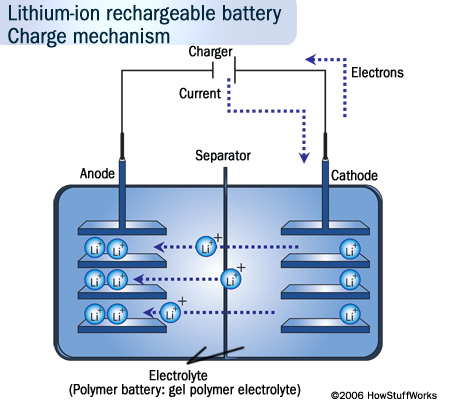 The movement of these lithium ions happens at a fairly high voltage, so each cell produces 3.7 volts. This is much higher than the 1.5 volts typical of a normal AA alkaline cell that you buy at the supermarket and helps make lithium-ion batteries more compact in small devices like cell phones. Graphic provided by HowStuffWorks.com
The movement of these lithium ions happens at a fairly high voltage, so each cell produces 3.7 volts. This is much higher than the 1.5 volts typical of a normal AA alkaline cell that you buy at the supermarket and helps make lithium-ion batteries more compact in small devices like cell phones. Graphic provided by HowStuffWorks.com
CHICAGO - The National Alliance for Advanced Transportation Battery Cell Manufacture, formed last month, is working on a proposal to the federal government for investment as part of the development of one or more manufacturing and prototype development centers across the United States, which will be shared by the Alliance members. “The Alliance will develop and operate a state-of-the-art manufacturing foundry that will permit any U.S.-based battery companies to design, test, and manufacture proprietary and semi-proprietary large format lithium-ion battery cells that power next generation motor vehicles,” said Carlos Helou, president of Grep International, a Darien, Ill.-based consulting firm in the energy arena, and an advisor to the Alliance. It is still undecided as to what avenue the Alliance will take in an effort to secure investment. “There are two ways,” said Ralph Brodd, president of Brodd Arp of Nevada. Las Vegas, a longtime consultant to battery manufactures, and an advisor to the Alliance. “There was a law that was passed last year of $25 billion that the Department of Energy put through and so the funds (to the Alliance) could be part of that, or there could be a new initiative by one of the senators that feels that they would rather have more control than giving it to DOE. It could go either way,” said Mr. Brodd. “Developing the capacity to mass manufacture advanced battery cells is anticipated to require an investment of $1 to $2 billion over five years. Lacking current orders for advanced transportation batteries, no U.S.-based companies can assume the risk of making such an investment,” said the U.S. Department of Energy’s Argonne National Laboratory, in a statement. The laboratory is a leader in the development of new battery technologies, and an advisor to the Alliance. The founding members of the Alliance include: 3M, ActaCell, All Cell Technologies, Altair Nanotechnologies, Dontech Global, EaglePicher Corporation, EnerSys, Envia Systems, FMC, MicroSun Technologies, Mobius Power, SiLyte, Superior Graphite, and Townsend Advanced Energy. Additional battery developers and materials suppliers are anticipated to join the Alliance, according to Argonne.